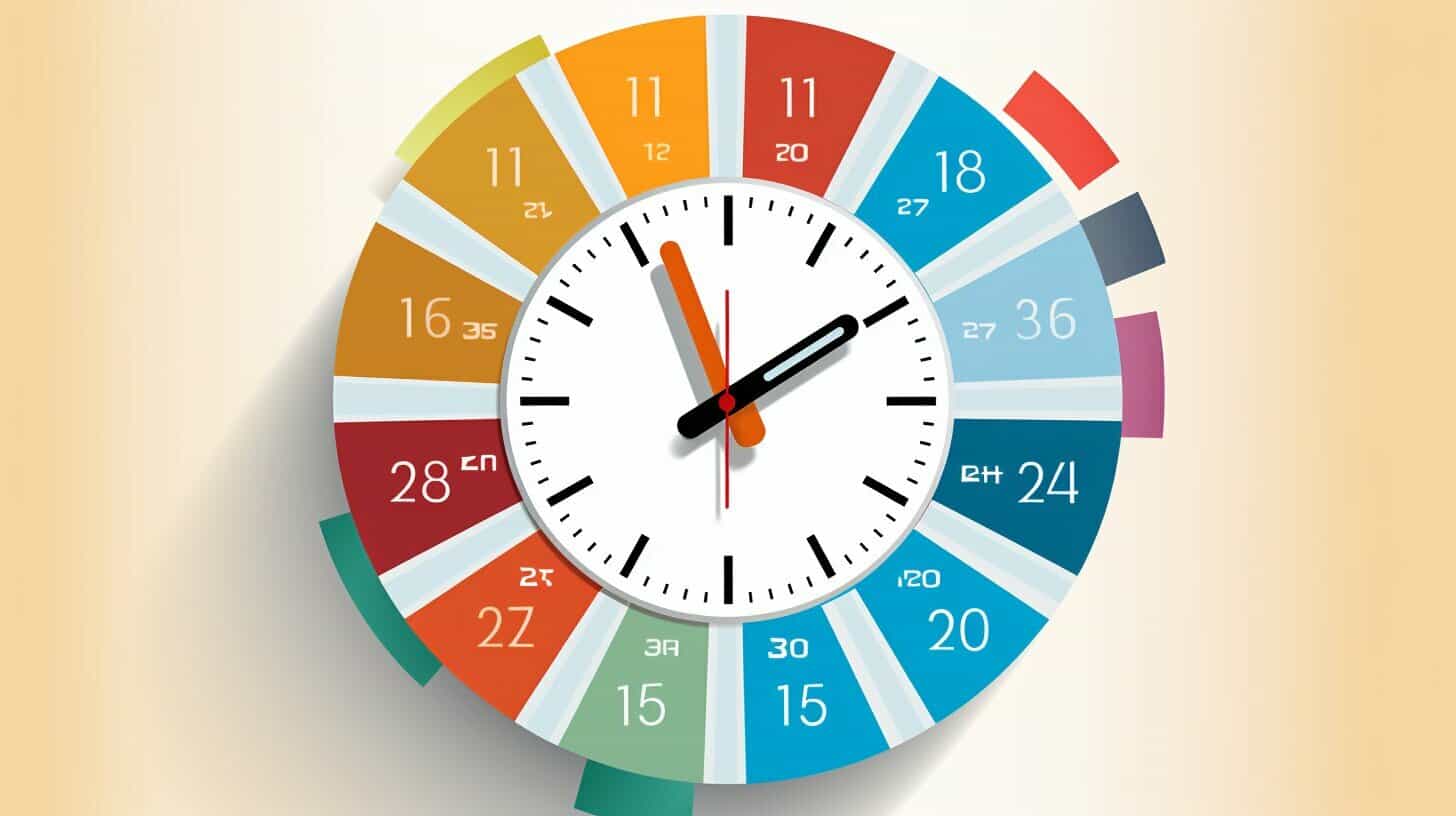As a professional, I understand the importance of staying productive and completing tasks efficiently. However, as the work piles up, it can be difficult to prioritize and manage our time effectively. That’s why understanding the objectives of time management is crucial for success.
By mastering time management techniques, we can enhance our productivity, reduce stress, and achieve a better work-life balance. In this section, we’ll delve into the key principles and concepts behind effective time management, providing you with a solid foundation to optimize your skills.
Key Takeaways
The Benefits of Time Management
The advantages of effective time management are numerous and extend far beyond just getting more done in less time. By mastering the art of time management, I can reduce stress levels and increase efficiency, ultimately leading to a more balanced, fulfilling life.
One of the most significant benefits of time management is the ability to prioritize tasks. By assigning priorities to my assignments, I can distinguish between what is urgent and what is not, allocating my time and resources accordingly. This, in turn, reduces the stress of having to juggle multiple responsibilities simultaneously.
Another advantage of time management is the ability to achieve work-life balance, which is essential for maintaining overall well-being. With proper time management, I can allocate enough time to work without sacrificing time spent with family and friends. This leads to improved relationships and greater personal satisfaction.
Finally, time management provides the opportunity to increase productivity and efficiency. By prioritizing and committing the appropriate amount of time to each task, I can accomplish more with less effort. This leaves me with additional time to explore new opportunities and further improve my skills.

Essential Time Management Techniques
Effective time management is a key skill that can boost productivity and help us achieve our goals. By mastering the essential techniques of time management, we can optimize our use of time and accomplish more in less time. Here are some essential time management techniques that I have found to be particularly effective:
Prioritization
One of the most important time management techniques is prioritization. By identifying the most important tasks and prioritizing them, we can ensure that we are focusing our time and energy on the most impactful work. I like to use the Eisenhower Matrix, which divides tasks into four categories: important and urgent, important but not urgent, urgent but not important, and neither important nor urgent. By prioritizing tasks based on this matrix, I can focus on the tasks that are both important and urgent, while minimizing distractions from less important work.
Goal Setting
Another essential time management technique is goal setting. By setting clear, specific goals, we can focus our efforts on the tasks that will help us achieve those goals. I like to use the SMART framework for goal setting, which stands for Specific, Measurable, Achievable, Relevant, and Time-bound. By setting goals that meet these criteria, we can ensure that our efforts are aligned with our overall objectives.
Task Delegation
Delegating tasks to others is another important time management technique. By delegating tasks to others, we can free up time and energy to focus on more important work. It’s important to identify tasks that can be delegated, and to delegate them to individuals who have the necessary skills and expertise to complete them effectively.
Time Blocking
Time blocking is a technique that involves breaking up the day into blocks of time, and assigning specific tasks to each block. By scheduling our time in this way, we can ensure that we are allocating enough time to each task, and that we are not wasting time on unproductive activities. I like to use a digital calendar to schedule my time, as this allows me to easily adjust my schedule as needed.

The Importance of Time Management
As I’ve learned in my experience with time management, it’s crucial to prioritize this skill in both our personal and professional lives. Effective time management can enhance our overall success, improve decision making, and create a sense of control over our lives.
By managing our time efficiently, we can accomplish more tasks, meet deadlines, and reduce stress levels. Having control over our time empowers us to make the most of our day and focus on our priorities. We can allocate our time effectively, taking into account our energy levels, strengths, and weaknesses.
Moreover, time management can help us balance our work and personal lives, leading to a healthier lifestyle. When we prioritize our time, we can avoid burnout and maintain our well-being, reducing the risk of chronic stress and other health issues.
Therefore, it’s essential to understand the importance of time management and incorporate it into our daily routine. By doing so, we can improve our productivity, enhance our overall success, and enjoy a healthier, more balanced lifestyle.
Time Management Strategies for Success
Effective time management requires more than a to-do list and a calendar. It involves adopting habits and strategies that help you work productively and efficiently. By implementing the following time management strategies, you can boost your productivity and achieve your goals.
1. Time Blocking
Time blocking is a time management technique that involves breaking your day into dedicated time slots for specific tasks or activities. By scheduling and allocating a specific amount of time for each task, you can avoid distractions and stay focused on what needs to be done. This strategy is particularly useful when you have a lot of tasks to complete with tight deadlines.
2. Using Productivity Tools
Productivity tools are essential for enhancing time management skills. A to-do list app can help you keep track of tasks, while project management software can help you collaborate with team members and delegate tasks. You can also use time-tracking apps to monitor your work hours and identify any time-wasting activities.
3. Creating Routines
Creating routines is an effective way to optimize your time and increase productivity. Routines help you establish a structure for your day, making it easier to stay focused and avoid distractions. By incorporating routines into your daily life, you can create a more efficient and consistent workflow.
4. Prioritizing Tasks
Prioritizing tasks is a key time management technique that involves identifying the most important and urgent tasks. By completing high-priority tasks first, you can avoid feeling overwhelmed and ensure that you’re making progress towards your objectives. You can also use the Eisenhower Matrix, which categorizes tasks based on their urgency and importance.
Implementing these time management strategies can help you realize your full potential, stay organized, and achieve your goals.

Effective Time Management Tips
As someone who has struggled with time management in the past, I know how daunting it can be to optimize one’s productivity. However, over time, I’ve discovered several techniques and strategies that have helped me make the most of my time. Here are some effective time management tips that have worked for me:
- Set realistic deadlines: When setting deadlines for tasks, it’s important to be honest with yourself about how much time you’ll need. Aim for a deadline that is achievable but also pushes you slightly outside your comfort zone.
- Minimize distractions: Staying focused can be a challenge, especially when faced with distractions like social media or email notifications. Set aside dedicated blocks of time with no interruptions and use apps or extensions to limit distractions during these periods.
- Take breaks: It’s important to take regular breaks to avoid burnout and maintain productivity. Use the Pomodoro technique or similar time-blocking methods to structure your time and incorporate regular breaks into your schedule.
- Use a to-do list: Creating a to-do list can help you prioritize tasks and stay on track. Use a digital app or simply write your list out on paper – whatever works best for you.
Implementing these tips will help you optimize your time and achieve your goals more efficiently. Don’t be afraid to experiment with different techniques and find what works best for you. With practice and persistence, you’ll soon be a time management pro!
Setting Time Management Goals
Setting effective time management goals is crucial for productivity and success. By establishing clear objectives, you can prioritize tasks and allocate your time efficiently. But how do you set effective time management goals? Follow these steps:
- Be specific. Define your goal as clearly as possible. Instead of “improve time management skills,” try “reduce time spent on social media by 30 minutes per day.”
- Make it measurable. Set a specific target to track your progress. Complete all work tasks by 5 PM” is more measurable than “finish work on time.
- Make it achievable. Set a realistic goal that you can accomplish within a reasonable timeframe. “Read one chapter of a book per day” is more achievable than “read an entire book in a day.”
- Ensure it is relevant. Align your goal with your overall objectives. Increase client satisfaction by responding to all emails within 24 hours” is relevant for a customer service job, but not for a creative role.
- Make it time-bound. Set a deadline to motivate yourself. “Complete all quarterly reports by Friday” is more time-bound than “complete quarterly reports.”
By following these principles, you can set SMART goals that drive your productivity and success. Remember to review and adjust your goals regularly to ensure continued progress.

Utilizing Time Management Tools
Time management tools can be a game changer when it comes to boosting productivity. By streamlining your workflow and automating certain tasks, you can save time and focus on more important responsibilities. Here are some popular time management tools you can consider:
| Tool | Description |
|---|---|
| Digital calendars | These tools help you keep track of your schedule, set reminders, and manage appointments. Popular options include Google Calendar and Outlook Calendar. |
| Task management apps | These apps help you create to-do lists, assign tasks, and track progress. Popular options include Trello, Asana, and Todoist. |
| Time-tracking software | These tools help you monitor how you spend your time, identify time-wasting activities, and track billable hours. Popular options include RescueTime and Toggl. |
There are also browser extensions and plugins that can help boost your productivity. For example, StayFocusd and Cold Turkey Blocker can limit time spent on social media or other distracting sites. Grammarly and Hemingway can help improve your writing skills and eliminate mistakes.
When considering which time management tools to use, it’s important to evaluate your needs and choose tools that align with your goals. Don’t be afraid to experiment with different options until you find what works best for you.
The Importance of Maintaining a Work-Life Balance through Time Management
As I progressed in my career, I realized that effective time management was crucial for maintaining a healthy work-life balance. By allocating time for both work and personal life, I was able to avoid burnout and improve my overall well-being. Here are some strategies I found helpful:
- Set boundaries: I established clear boundaries between work and personal life. For instance, I wouldn’t check work emails during weekends or after work hours.
- Take breaks: I took regular breaks during the day to recharge and prevent burnout. This improved my productivity and efficiency at work.
- Prioritize activities: I prioritized activities based on their importance and urgency. This helped me allocate my time effectively and eliminate activities that were not necessary.
Overall, effective time management was essential for my work-life balance. By implementing these strategies, I was able to lead a more fulfilling and balanced life.
Conclusion on Objectives Of Time Management
As I wrap up this article, I want to emphasize the importance of time management in our daily lives. By mastering the objectives, techniques, and strategies involved, we can take control of our time and achieve our goals efficiently.
Remember, effective time management not only leads to increased productivity but also reduces stress and helps maintain a healthy work-life balance. It may take some time to develop these skills, but with consistent effort and practice, you can make significant improvements in managing your time.
I encourage you to start implementing the tips and techniques we’ve covered in this article today and strive towards a more productive and fulfilling life.
FAQ on Objectives Of Time Management
Q: What are the objectives of time management?
A: The objectives of time management are to boost productivity, enhance efficiency, prioritize tasks effectively, reduce stress, and improve work-life balance.
Q: What are the benefits of time management?
A: Time management offers numerous benefits, including reduced stress levels, increased efficiency, improved work-life balance, and the ability to accomplish more in less time.
Q: What are some essential time management techniques?
A: Essential time management techniques include prioritization, goal setting, task delegation, time blocking, using productivity tools, creating routines, and setting SMART goals.
Q: Why is time management important?
A: Time management is important because it enhances overall success, improves decision-making abilities, and provides a sense of control over one’s life, both personally and professionally.
Q: What are some time management strategies for success?
A: Time management strategies for success include time blocking, using productivity tools, creating routines, setting realistic deadlines, and minimizing distractions.
Q: What are some effective time management tips?
A: Effective time management tips include setting realistic deadlines, prioritizing tasks, minimizing distractions, taking regular breaks, and utilizing time tracking techniques.
Q: How do I set time management goals?
A: To set effective time management goals, use the SMART criteria (Specific, Measurable, Achievable, Relevant, Time-bound) and establish clear objectives that drive productivity and effective time allocation.
Q: What time management tools can I use?
A: There are various time management tools available, such as digital calendars, task management apps, time-tracking software, and productivity apps that can help you streamline your workflow and maximize productivity.
Q: How does time management contribute to work-life balance?
A: Effective time management helps maintain a healthy work-life balance by allowing you to allocate time to both work and personal life, avoid burnout, and foster overall well-being.





Leave a Reply